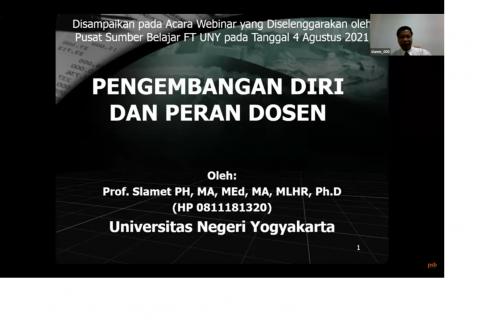The role of lecturers in the culture of excellence and togetherness

Two things that must continue to be imprinted in the lecturer's personality are the goals to be achieved and the efforts that need to be taken to achieve them. The goal to be achieved by lecturers is a life choice and requires alternative thinking because there is no final truth and also no absolute conservatism because to become a successful and professional person the efforts that need to be taken to achieve the goal cannot be as usual but must be used to automatic thinking towards critical thinking. This was conveyed by Prof. Slamet, PH, MA, M.Ed, MLHR, MA, Ph.D., as a guest speaker in the Webinar Series organized by the Learning Resource Center of the Faculty of Engineering, Yogyakarta State University (PSB FT UNY) - (04/08/2021).
Slamet added that creative thinking is daring to get out of the existing axioms or being born ahead of its time and of course it is very risky.
Whatever the reason, efforts to strengthen oneself so as not to be underdeveloped are human instincts that do contain risks. Sharing ideas is intuition based on life experiences, not text but rather on the context experienced.
"The power of thinking for a lecturer should be high, deep, far, compound, broad, whole and strategic," he continued.
"In addition to outward capacity, inner nutrition should also be considered as a lecturer by working sincerely, happiness should never be sacrificed, develop a giver mentality, get along as it is, have a positive attitude, love others, never hurt people's feelings, have a feeling that there is no absolute truth, final conservatism and be comfortable with change and friendly with the future," explained Slamet.
"The desired attitudes and actions of lecturers are academic, humanist, religious, ecological, democratic, economical, nationalist, globalist, independent and free," said Slamet.
Slamet reminded that the 21st century is unpredictable and predictable and endless, so it requires humans who are friendly to the future and have high capabilities, namely mastering their expertise, being fast, agile, flexible, adaptive, anticipatory, proactive and even promotive.
"Future lecturers must have a culture of excellence and a culture of togetherness. Do not be comfortable with single and narrow thinking but must be full of new knowledge carried out through self-development," said Slamet.
"Use common sense and conscience in facing concurrent changes," he concluded.
